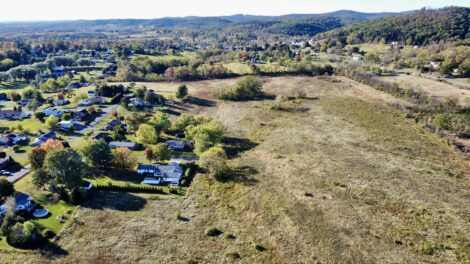‘A ripple effect’: Developer revises plans for Kim Estates, a housing project slated to be built in Hughesville

DCIM100MEDIADJI_0173.JPG
Work on the housing development, which has come to be known as the Kim Estates, is moving forward and the developers, ILK Family LLC will soon “be ready to break ground and start spending some money,” Virginia Feigles-Kaar, of Dewberry Engineer Inc., reported to the Lycoming County Commissioners.
“Our HOP (Highway Occupancy Permit) permit is on the way, Hopefully we’ll soon have the design to the point where we can submit our permit applications,” Feigles-Kaar said.
Earlier this year the developers had obtained a housing initiative grant agreement with the county for a two-phase project with $500,000 for each phase. Housing initiative monies are used for properties that offer fair market housing, which is not to be confused with low income housing.
Located in the Hughesville-Wolf Township area, the project is currently in the design phase with fewer units planned than had been announced initially.
The preliminary draft, which was introduced at that time, featured 130 separate dwelling units including 80 townhomes, 24 duplexes and 26 single family dwellings northwest of Bodine Park in Hughesville, but Feigles-Kaar had indicated that number had been scaled back due to drainage problems.
In April, the housing plan for the project showed 18 four-unit town houses, 28 single-family dwellings and 24 duplexes for a total of 124 units. When contacted after the commissioners’ meeting, Feigles-Kaar said that because the township did not want cul-de-sacs in the plan, with curbing another property was eliminated, so that the development now features 123 properties. All properties will be owned by the occupants. There will be no rental units, she stressed.
The project has been the subject of several contentious community meetings, with local residents opposing it because of the problem with run-off on the 68-acre tract where it will be located. Most of the land is in Wolf Township with a small portion in Hughesville Borough. Both had rejected the initial permit.
“We have to submit a plan and get our plan approved. Our original plan was rejected,” she stated.
Now a new plan will be submitted to the two municipalities, which will incorporate the suggestions made when turning down the first proposal.
“We’ve taken into consideration some of their requests. They don’t want to hold us back,” she said.
“Within the next week or two, the county should be getting a new plan set, and so should the township,” she said, adding, “We’re there.”
The number one concern expressed by those opposing the project was the drainage problems because of the location of the property.
At a Wolf Township Planning Commission meeting in April a design plan was presented which showed a three-phase plan to build the housing units, add roadways to access the borough and Route 220. There were also a total of five stormwater retention basins along with stormwater management concepts to slow runoff from the site into borough and township properties, according to reporting from the Sun-Gazette.
Responding to a question from Commissioner Scott Metzger about the traffic issue related to the development, Feigles-Kaar said, “They don’t understand that the day we get the plan signed there’s not gonna be 112 home there. It’s gonna take time.”
She noted that the Department of Transportation did not require a traffic study to be done for the project.
“One of the things that we constantly talk about is housing, and we talk about population drops,” said Commissioner Mark Mussina. “We realize that one of the challenges for areas like ours is because of the gas industry and all that it has brought, one of the downsides is people aren’t selling off farms to develop farms. So we are challenged here in Lycoming County as to places that we can do developments,” he continued.
“We understand there’s always fear from anyone who’s been in a neighborhood for a long time, and they’re like, we like it the way it is, we don’t want any changes, but when you look at the developments that have happened…they’ve all done nothing but benefit the community,” Mussina said.
Addressing the concerns of local residents, Feigles-Kaar stressed that the ILK Family Inc. — the land owners, or the Kim Family, “want to do a really nice development.”
“I don’t think their fears are very well-founded,” she added.
Commissioner Scott Metzger addressed the need for more housing in the county to encourage people to relocate here which would ultimately grow the tax base.
“The housing shortage was identified nationally but also locally, and that we had to have more homes for businesses that were coming in for their employees.and in my two terms…We have to grow our tax base,” Metzger said.
“It’s critical not only for employers to have housing for their employees, but it also helps the tax base to grow. And all this has a ripple effect. The key is to have proper homes, and it sounds like you’re identifying the proper homes that are needed for that area,” he said.
The housing initiative program which is the funding the Kim Estates received was “born out of the ARPA monies and those discussions,” Metzger said.
“The prior board of commissioners felt that we could allocate monies towards the infrastructure. If a developer comes to us and says, this is the type of homes I would like to build, can you help with the infrastructure and they meet the requirements, then the commissioners have done their part to provide those monies. It’s up to the townships to decide whether they want that in their area and whether it fits their codes and their requirements,” he said.
Commissioner Marc Sortman pointed out that the funds that was received for infrastructure came from Act 13 monies which are impact fees paid by the gas drilling companies.
“So act 13 monies that were set aside for developers by the previous board, not necessarily completely taken advantage of, but it just shows that there’s, there’s some value, and it’s not necessarily a waste of monies that went out, but it’s a grant coming from the county through Act 13 funds,” Sortman said.
“In no way (does it) give the county any additional rights to allow Dr Kim and his development team to do anything. We have no control, zero control, over what is done in that development- that is strictly municipalities…It has nothing to do with the county. We are not giving any special treatment to a developer that got this grant, not only Dr Kim, but the two other developers that got this grant, none of them get special treatment. They still have to follow the rules and policies of the community. We’re not in charge. The community is still in charge,” Sortman stressed.




